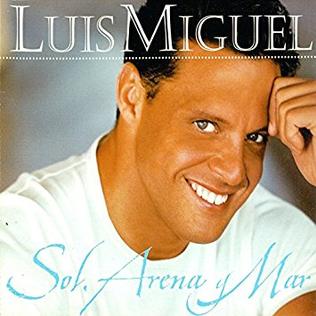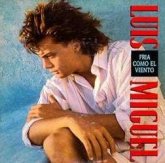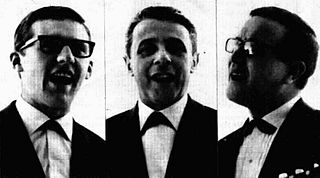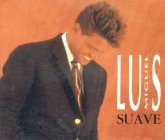Related Research Articles

Luis Miguel Gallego Basteri is a Puerto Rican–born Mexican singer and record producer. Born to parents of Spanish and Italian descent, he is often referred to as El Sol de Mexico, derived from the nickname his mother gave him as a child: "Mi sol". Luis Miguel has sung in multiple genres and styles, including pop songs, ballads, boleros, tangos, jazz, big band, and mariachi. Luis Miguel is also recognized as the only Latin singer of his generation to not cross over to the Anglo market during the "Latin Explosion" in the 1990s.
El día que me quieras is an Argentine tango with music by Carlos Gardel and lyrics by Alfredo Le Pera. It is considered one of the most popular songs of the 20th century and one of the best Latin songs of all time. Originally featured in the 1935 film of the same name, sung by Gardel himself, it became a heavily recorded tango standard, even by artists outside of the realm of tango. It has subsequently been covered by various artists such as Luis Miguel, Julio Iglesias, Michael Bolton Roberto Carlos, Raphael de España and Shlomo Idov who translated the song to Hebrew. The song was inducted into the Latin Grammy Hall of Fame in 2001. "El día que me quieras" was honored at the 2014 La Musa Awards as "La Canción de Todos los Tiempos". It was among the tango standards selected by Plácido Domingo for his 1981 album Plácido Domingo Sings Tangos. In addition to Domingo, the song has been covered by operatic tenors including José Carreras, Juan Diego Florez, Christian Ketter, and Alfredo Kraus.

Cuando calienta el sol is a 1963 Argentine film directed by Julio Saraceni.
"Love Me with All Your Heart" is a popular song, based on the Spanish language song "Cuando calienta el sol", originally composed as "Cuando Calienta El Sol En Masachapa". The music was written by Rafael Gastón Pérez, a Nicaraguan songwriter and bandleader. SADAIC also credits the Argentine composer, Carlos Albert Martinoli.

"Sol, Arena y Mar" is a song written by Arturo Perez, Francisco Loyo, and Salo Loyo and co-written, produced, and performed by Mexican singer Luis Miguel. It is a horn-driven uptempo pop song with jazz influence which deals with a strained relationship. The song's lyrics were rumored to have been influenced by Miguel's previous relationship with Daisy Fuentes. It was released as the lead single from the album Amarte Es un Placer on 19 July 1999.

"Dormir Contigo" is a song written by Armando Manzanero and produced and performed by Mexican singer Luis Miguel. The song is a pop ballad in which the protagonist expresses the joy of sleeping with his partner. It was released as the third single from the album Amarte Es un Placer in January 2000. The track peaked at number 11 Billboard Hot Latin Songs chart in the United States and number two on the Latin Pop Songs chart.

Soy Como Quiero Ser is the fifth studio album recorded by Mexican singer Luis Miguel and his first album to be released by WEA Latina on July 15, 1987. The album was subtitled "Luis Miguel '87: Soy Como Quiero Ser". The singers Laura Branigan and Rocío Banquells appear on two of the album's tracks as backup vocals. The majority of the songs included are Spanish-language adaptations of popular songs from the 1960s, 1970s and 1980s.

Mexican pop-rock band Maná has released 9 studio albums, 3 live albums, 7 compilation albums, 5 video albums, 2 box sets and 1 soundtrack album. Throughout their career, Mana has sold over 40 million albums worldwide, becoming the most successful Latin American band of all time. ¿Dónde Jugarán Los Niños? remains as the best-selling Spanish-language rock album in history with 10 million copies sold worldwide.

Cómplices (transl. Accomplices) is the 18th studio album by Mexican singer Luis Miguel, released on 2 May 2008 by Warner Music Latina. The record is a collaboration with Spanish musician Manuel Alejandro, who wrote and arranged the songs, and co-produced the album with Luis Miguel. Musically, it is a pop album of mostly ballads and a few uptempo tracks with lyrics emphasizing romance. Two singles were released to promote the album: "Si Tú Te Atreves" and "Te Desean". To further promote the record, Luis Miguel embarked on the year-long Cómplices Tour from September 2008 to September 2009. He performed in North America and a few countries in South America.

Bandido is the fourth studio album by Spanish duo Azúcar Moreno, released on CBS-Epic in 1990. The album became the Salazár sisters' international breakthrough.

"Fría Como el Viento" is a ballad written, produced and arranged by Juan Carlos Calderón and performed by Mexican singer Luis Miguel. It was released as the first single from the Grammy-nominated studio album Busca una Mujer (1988). The song became the third number-one single for the singer in the Billboard Hot Latin Tracks chart after "Ahora Te Puedes Marchar" in 1987 and "La Incondicional", the preceding single.
"Entrégate" is a pop song written, produced and arranged by Juan Carlos Calderón, and performed by Mexican singer Luis Miguel. It was released as the second single from his Grammy Award nominated studio album 20 Años (1990), and became his fifth number-one single in the Billboard Top Latin Songs chart. The parent album became commercially successful, with sales records throughout Latin America, with six of its singles entered the charts in Mexico simultaneously. After its release, Miguel was recognized as the leading male vocalist in Latin America.

"Por Debajo de la Mesa" is a song written by Armando Manzanero and performed by Mexican recording artist Luis Miguel. Arranged by Bebu Silvetti, it was one of the two original compositions written for Miguel's fifteenth studio album Romances. It was released as the lead single from the album on 15 July 1997 and it became his thirteenth number-one single on the Billboard Hot Latin Songs chart in the United States. The music video features Miguel performing at a fine-dining restaurant in New York City.

"O Tú o Ninguna" is a song written by Juan Carlos Calderón and produced and performed by Mexican singer Luis Miguel. The song is a bolero in which the protagonist cannot envision his life without anyone else besides his love interest. It was released as the second single from the album Amarte Es un Placer on 6 September 1999. The track topped the US Billboard Hot Latin Songs chart; and reached the top-five in Guatemala, Nicaragua and Panama.
"Inolvidable" ("Unforgettable") is a song written by Julio Gutiérrez in 1944. It is considered one of the most popular boleros released during the Cuban musical movement led by pianists. The song has been recorded by several performers, including Roberto Carlos, Diego El Cigala, Fania All-Stars, Eydie Gormé, Danny Rivera, Tito Rodríguez and Bebo Valdés, among others.

Los Marcellos Ferial are an Italian vocal group, mainly active in the sixties, consisting of Marcello Minerbi, Carlo Timò and Tullio Romano.
Los Hermanos Rigual were a Cuban vocal group based in Mexico, mainly active in the sixties. It consisted of the brothers Pedro, Carlos and Mario Rigual, all natives of Guantánamo.

"Suave" (transl. "Smooth") is a song by Mexican singer Luis Miguel from his ninth studio album, Aries (1993). The song was composed by Kiko Cibrian and Orlando Castro with the former handling its production along with the artist. It is a dance number in which the singer describes a woman who bewitches him and becomes the woman of his dreams. The song received positive reactions from two music critics. It was acknowledged as an award-winning song at the 1995 Broadcast Music Inc. (BMI) Latin Awards. Commercially, the song reached number nine on the Billboard Hot Latin Songs chart in the United States. Its music video was directed by Kiko Guerrero and filmed in Acapulco, Mexico, and features Miguel dancing in a beach with several women.
"Sabor a Mí" is a 1959 bolero by Mexican composer and singer Álvaro Carrillo. Upon its release, it was recorded by many acts such as Los Tres Ases and Rolando Laserie, becoming the most successful song of 1960 in Mexico. It was further popularized by Los Panchos, who collaborated on their rendition with Eydie Gormé in 1964. Among the over 300 songs that he created, this song was considered Carrillo's biggest hit both in Mexico and internationally. Since its creation, the song has been covered by several artists, including among them Mexican singers Luis Miguel and José José, Cuban jazz pianist Bebo Valdes, k-pop boygroup EXO, and the Mexican American musicians Los Lobos.
"El reloj" is a song of the bolero genre, with music and lyrics by Mexican composer and singer Roberto Cantoral, then a member of the Los Tres Caballeros trio.
References
- ↑ "BMI repertoire search for Cuando calienta el sol". Repertoire.bmi.com. Retrieved 2014-05-23.[ permanent dead link ]
- ↑ "Los Hermanos Rigual "Cuando calienta el sol", su nº 1 en España inició la moda de las canciones del verano | Valencia Magazine". Nicolasramospintado.wordpress.com. 2007-01-30. Retrieved 2014-05-23.
- ↑
- ↑ "Luis Miguel: Chart history – Hot Latin Songs". Billboard. Prometheus Global Media. Retrieved 6 March 2017.
- ↑ "Jorge 'El Burro' Van Rankin presume foto de su cita con Luis Miguel". La Opinión (in European Spanish). 27 April 2018. Retrieved 25 July 2018.
- ↑ "LOVE ME WITH ALL YOUR HEART (CUANDO CALIENTA EL SOL) - Lyrics - International Lyrics Playground". Lyricsplayground.com. 2007-10-10. Retrieved 2014-05-23.
- ↑ Whitburn, Joel (2002). Top Adult Contemporary: 1961-2001. Record Research. p. 53.
- ↑ "officialcharts.com". Official Charts . Retrieved June 29, 2021.